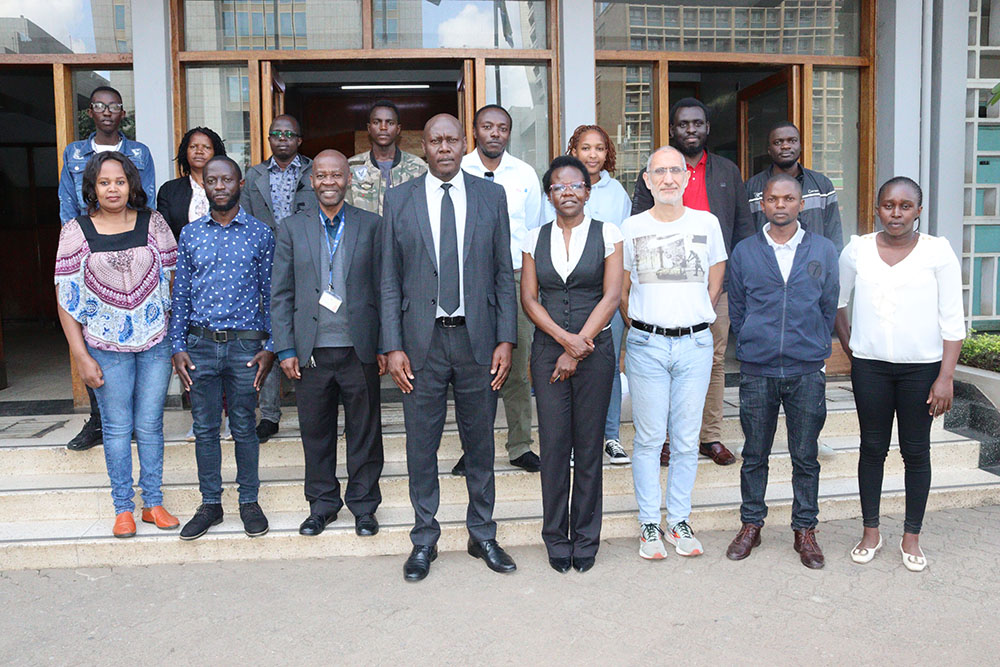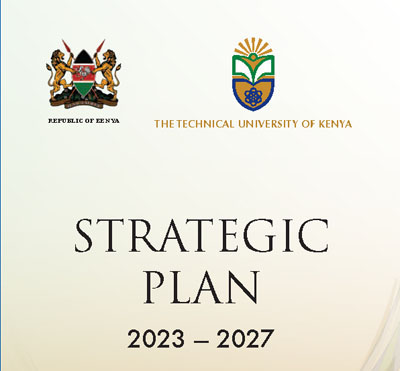Advanced Physics Training in Collaboration with Africa (APhRICA) Programme has officially been launched at the Technical University of Kenya. The event was launched by Deputy Vice-Chancellor in charge of Research and Technology Development (RTD), Prof. Isaac Orina, on behalf of the Vice-Chancellor Prof. Benedict Mutua.
This marks the first time the project is being launched in Africa, whereby 10 students of Physics, pursuing Master’s and PhD from different Kenyan universities, will be trained for two years, at the International Centre for Theoretical Physics-East African Institute of Fundamental (ICTP-EAIFR) in Kigali, Rwanda. The students are primary participants in the programme. Out of the 10 students, three are from TU-K.
Prof. Orina thanked the sponsors and organisers of the event for bringing it to TU-K, saying that they worked hard to ensure the event was successful.
He congratulated the participants for having been selected competitively saying the training will give them requisite knowledge, skills, exposure and opportunity to interact with expertise from world over.
“Make use of the opportunities, open your antennae, establish networks and collaborations that would be beneficial to your studies and careers. On behalf of the University, we are pleased with such trainings and workshops and we wish you all the best.”
The first part of the training is planned to take place at ICTP-EAIFR in December 2024 for 2 weeks, which will cover foundational topics. The rest of the 2-year long programme will take place in 2 week-long events.
Dr. Andrea Marini who doubles up as a trainer, is a distinguished scholar and researcher. He is currently the head coordinator of the Ab-initio Yambo project, a worldwide known, open source code for steady-state and real-time excited state Ab-Initio calculations. Yambo is a member of the Partnership for Advanced Computing in Europe (PRACE) and it is installed on many High-Performance Centers around the world.
He is also part of the National Centre for HPC, Big Data and Quantum Computing, member of the International Advisory Panel of the African School on Electronic Structure Methods and Applications network and he is currently teaching Advanced Quantum Mechanics and Many–Body Theory at the East Africa Institute for Fundamental Research located in the University of Rwanda, Kigali.
He explained that discussions are ongoing to add more students to the programme. This he added, will be achieved through mutual engagements and structured formal agreements.
He noted that the funding will be going for one year and therefore there will be need to apply for more funding from CNRS (Paris, France) to cate for the training for another one year.
“Our goal is train more students and staff to take advanced physics a notch higher and compete with the same level with their counter parts in Europe. I am not aware of any code used for training physics, that is produced in Africa. Meaning the research is still low,” he observed.
Dr. Marini challenged students and staff to read papers and invest in proper training.
The students will be traveling to Kigali Rwanda for two weeks training, beginning on Monday 9th December, 2024.
Acting Executive Dean Faculty of Applied Sciences and Technology (FAST) Prof. George Amolo, acknowledged Dr. Marini’s effort saying he has invested his time and resources in training students and staff in Africa. This he added, has enhanced the existing training and addressed gaps in knowledge.
“You have a track record, you have invested in the future generation and few years from now, you will look back and see that indeed you did well for the continent,” said Dean adding that students will be trained to develop neglected areas in physics.
In attendance were; Ag. Director School of Physics and Earth Sciences Dr. Lydia Olaka and lecturer from the School, Dr. Michael Atambo who noted that for the continent to continue producing world-class research and innovation, as well as go beyond the state of the art, the training is essential for graduate students, faculty and future researchers.
The training is sponsored by Istituto di Struttura della Materia (ISM) of the National Research Council (CNR), Italy and Centre National de la Recherche Scientifique (CNRS), Ecole Polytechnique, Paris-Saclay University, Sorbonne Université Campus Pierre et Marie Curie and Laboratoire de Chimie Theorique, France.
Universities taking part include; Technical University of Kenya, Masinde Muliro University of Science and Technology, Moi University, Egerton University, Kaimosi Friends University, Maasai Mara University.



